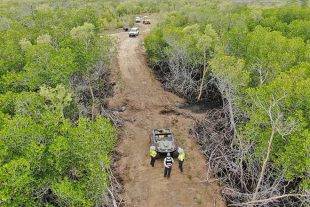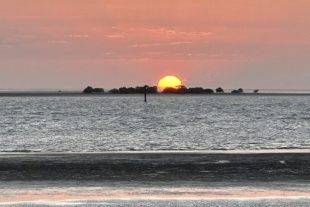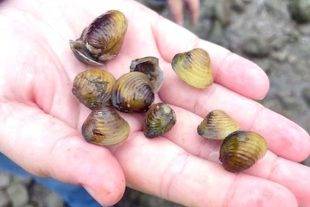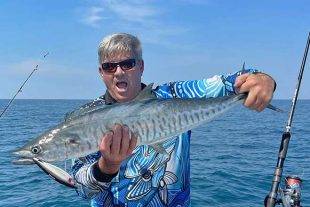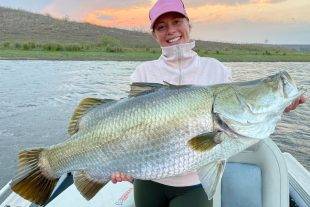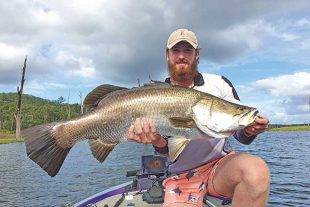A Townsville man has been ordered to pay close to $145,000 in relation to illegally clearing almost three football stadiums-worth of internationally-recognised wetlands in the Cape Cleveland section of Bowling Green Bay National Park. Between October 2019 and June 2020, the man illegally cleared over 19,000 square metres of previously untouched wetlands to build a road more than 2km long …
Read More »New net-free fishing zones planned for Gulf of Carpentaria
Minister for Agricultural Industry Development and Fisheries and Minister for Rural Communities The Honourable Mark Furner From May this year new gillnet fishing zones will be introduced in the Gulf More than 4000 submissions provided feedback on consultation paper Industry assistance and adjustment package to be rolled out Full suite of changes to be announced within weeks. Gillnet-free fishing zones …
Read More »Important information on sooty grunter
Important – any sooty grunter caught in the Mary River MUST be destroyed, no matter the size. Same applies to any sooty grunter caught in any southeast Queensland waterways. This announcement comes on the back of sooty grunter potentially being caught and released into waterways that are NOT their natural environment. This causes an imbalance in the system and impacts …
Read More »Freshwater gold clam found in Brisbane River
A highly invasive species of clam, freshwater gold clam (Corbicula fluminea), has been detected for the first time in Australia at several places along the Brisbane River at Savages Crossing, Colleges Crossing and Riverside Park. Freshwater gold clam is highly invasive because of its rapid growth rate, high reproductive rate, and ability to broadcast its larvae over a broad area …
Read More »Spanish mackerel and coral trout monitoring
Did you know Fisheries Queensland have measured over 10,000 spanish mackerel in the Torres Strait since 2019 as part of our Torres Strait Biological Sampling Program? Fisheries Queensland are working with Torres Strait communities in collecting length, sex and age information about their catches of spanish mackerel and coral trout species. This helps provide more certainty about the management arrangements …
Read More »Queensland Aquarium Fish Fishery
The Department of Climate Change, Energy, the Environment and Water received an application from the Queensland Department of Agriculture and Fisheries on November 27, 2023. The application has been prepared to address the guidelines for the ecologically sustainable management of fisheries – second edition – and will be used to assess the operation of the fishery for the purposes of …
Read More »Confusion about SIPS
While the majority of people do the right thing, Fisheries Queensland have recently come across a few who were confused about the Stock Impoundment Permit process (SIPS). There are 63 dams and weirs in Queensland that require a SIP to fish with a line The impoundments are stocked with native fish specifically for recreational fishing The fees go towards …
Read More »$800k in grants for Queensland fishers
Queensland fishers are invited to apply for a share of $800,000 in funding on offer under the Palaszczuk Government’s fishing grants program and Indigenous fishing and forestry grants programs. Minister for Agricultural Industry Development and Fisheries and Minister for Rural Communities Mark Furner said the grants programs are helping to build a legacy of sustainable fisheries for our children and …
Read More »Interesting facts on coral trout
Coral trout fishers provide some of the freshest sustainably harvested seafood to Queenslanders. The firm pearly white flesh is considered to be the finest eating of all of our reef fish. Interesting facts: Don’t be fooled by the name – they’re not a trout at all, they’re actually a member of the grouper and cod family They’re ambush predators that …
Read More »It’s barramundi closed season on the east coast
Our Fisheries Queensland East Coast fisheries manager Daniel answers some questions about barramundi closed season: Why do we have closed barramundi seasons? Closed seasons are typically developed to reduce pressure on fish stocks during a period of vulnerability. Typically closed seasons are determined around the time when the fish is most likely to be spawning, migrating or aggregating. Do we …
Read More » Bush ‘n Beach Fishing Magazine Location reports & tips for fishing, boating, camping, kayaking, 4WDing in Queensland and Northern NSW
Bush ‘n Beach Fishing Magazine Location reports & tips for fishing, boating, camping, kayaking, 4WDing in Queensland and Northern NSW

